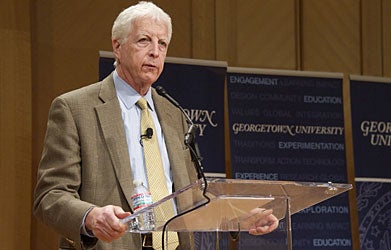Title: Ex-Columbia University Provost: Universities Must Innovate
Jonathan R. Cole, former provost at Columbia University, said universities need to nurture innovation for future generations at Georgetown’s latest Designing the Future(s) of the University event.
APRIL 2, 2014AMERICAN UNIVERSITY LEADERS NEEDto nurture innovation and the discovery of knowledge for future generations, the former Columbia University provost and dean said yesterday at Georgetown’s latest event exploring the future of higher education.
“… In reexamining the idea of the university and the structures of the 21st century, we must tend equally, if not more, to how we can improve and possibly transform for better the way our great universities incubate and grow knowledge,” Jonathan R. Cole said during the thirdDesigning the Future(s) of the Universityspeakers series.
A professor of sociology at Columbia since 1976 who served as provost and dean of faculties from 1989 to 2003, Cole recently turned his attention to addressing issues facing higher education, including problems affecting research universities.
MOUNTAIN KINGS AND QUEENS

“… In reexamining the idea of the university and the structures of the 21st century, we must tend equally, if not more, to how we can improve and possibly transform for better the way our great universities incubate and grow knowledge,” says Jonathan R. Cole, former Columbia University provost, during Tuesday’s Designing the Future(s) event.
He is the author ofThe Great American University: Its Rise to Preeminence, Its Indispensable National Role, Why It Must be Protectedand the upcomingWho’s Afraid of Academic Freedom?He is also editor ofThe Research University in a Time of Discontent.
Cole explained at the event that higher education is facing a paradox: Despite being “kings and queens of the mountain” of innovation, research and inquiry, universities and colleges need to find ways to transform and change their structures.
Georgetown’s Designing the Future(s) initiative engages the university community in exploring challenges facing higher education, treats the sector’s future as a design question and uses dialogue and workshops to look at innovation in teaching and learning.
PUMP-PRIMING IDEAS
Cole delivered remarks on higher education’s current challenges and then joined Georgetown President John J. DeGioia in a detailed discussion before taking questions from the audience.
Previous speaker series events featuredDeGioiawith Georgetown Provost Robert Groves and a session with former MIT PresidentSusan Hockfield(G’79).
During last night’s event, Georgetown released examples of draft ideas to develop discussion and identify experiments to expand innovation at the university.
The “Five Pump-Priming Ideas for New Ways to Deliver a Georgetown Education and Experience” document is designed to encourage experimentation and a rethinking of traditional boundaries of Georgetown degrees at the department and program level.
ENGINES OF INNOVATION
“These [ideas] are devoted to … how we may mount new degree programs that have various aspects that could affect quality and cost [of education],” Groves said.
Cole explained that American higher education is scrambling to reexamine itself in the wake of questions about the value of humanities degrees; fewer people studying science, math and engineering; concern over the cost of higher education; “rapidly ossifying” infrastructure and other issues.
“[American colleges and universities] are truly great because we are engines of innovation and discovery and of unfettered expression and questioning that we have created over the past century and that we – not other nations – threaten to dismantle,” he says.